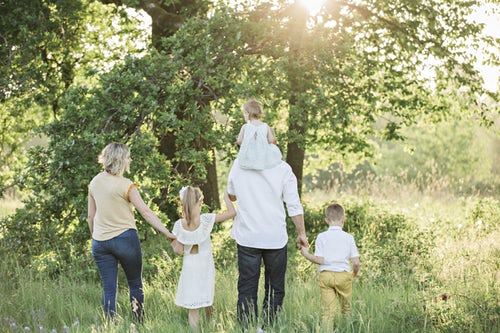
The attorneys at Nardone Limited in Columbus, Ohio, routinely assist dentists and other healthcare professionals by drafting and executing estate plans. Estate plans are not just a planning tool for individuals nearing the end of their lives, estate plans are also an important planning piece for young families and for some of life’s less expected events.
Prior Article
Our previous post, The Importance of Estate Planning, Even Under the New Tax Law, highlighted several non-tax related reasons why estate planning is still just as relevant as ever. One reason highlighted in that post is estate planning’s ability to allow parents to protect their children’s interests by electing a guardian in the event of the parents’ death or incompetency.
What is a Guardian?
A guardian is the person who looks after and is generally responsible for minor children whose parents have died or are otherwise incompetent.
There are two types of guardians for children. There is a guardian of the person and there is a guardian of the estate. The guardian of the person is the daily caretaker responsible for the health, education, housing, and other everyday needs of a minor child. This is the person generally considered when people think about guardianships. The guardian of the estate is the guardian with a fiduciary responsibility for managing a minor child’s inheritance. In the event there is a trust established for a child, the presence of a trustee often alleviates some of the guardian’s fiduciary responsibility, however, it is still important that the guardian and trustee share an understanding of their respective financial responsibilities. Although two types of guardians are described above, it is important to note that the same person usually acts in both capacities. Therefore, it is important that parents consider several different factors when considering a potential guardian. Those factors are discussed below.
Choosing a Guardian
Now that there is a better understanding of what the guardian is and what the guardian’s responsibilities are, we will review several factors parents must consider when reviewing candidates for a guardianship.
Shared Values and Character
Parents must remember that the guardian will take their place as the moral influence over a child. Therefore, it is very important that parents think about their own religious, political, and moral beliefs and whether the guardian’s same beliefs match. Obviously, there will never be a perfect match here. But, parents must consider which beliefs are most important to them and find the potential guardian that best fits these beliefs. If parents are unsure of the potential guardian’s beliefs, the parents should ask the potential guardian about their beliefs.
Financial Responsibility and Stability
As we discussed, the guardian has a fiduciary duty over a child’s inheritance. This is an important factor to consider for parents who are fortunate enough to leave their children a substantial inheritance. The potential guardian will be required to work alongside the trustee to determine the necessary expenses for a child’s health, education, maintenance, and best interests. Parents will also want a guardian who is able to stand their ground when it comes to a child spending their inheritance on “luxuries,” such as trips or cars. The potential guardian should be able to instill a sense of financial responsibility in a child.
It is okay if parents are unable to leave their children with a substantial inheritance. In fact, most parents cannot. But, if parents are unable to leave their children an inheritance, the parents must also consider the financial stability of the guardian. Any parent knows that raising a child is expensive. Parents will want to ensure that the potential guardian can and will continue to be able to financially provide for a child. In many cases, parents will want to select a guardian that will provide a similar, or even greater, lifestyle than the parents intended for a child.
Longevity
The adage that “age is just a number” does not necessarily apply to electing a guardian. In fact, the age of a potential guardian is a very important consideration and cuts both ways. On one hand, an older guardian (i.e., maybe a grandparent) usually embodies the financial responsibility and stability the parents are looking for. On the other hand, an older guardian might not fully understand current education and parenting trends—leaving an older guardian “out of the loop” in many parenting aspects. Parents must also consider that an older guardian may get sick or even pass away before a child reaches the age of 18. Meanwhile, a young guardian might lack certain parenting experience and responsibility.
Location
Location, location, location. Where a potential guardian lives is an important consideration, especially for a school-aged child. A child in need of a guardian is already traumatized by the death or incompetency of their parents. Asking a child to switch school districts or move far away from friends and family imposes an additional burden on a child’s grieving process. Parents must also consider the access other family members will want to a child. Grandparents, aunts, uncles, and other relatives will want to have a relationship with a child. Keeping a child relatively close to other family members will ensure that the family maintains a lasting connection.
Parenting Skills and Family Situation
One of the best indicators of a potential guardian’s ability to raise a child is that person’s ability to raise their own children. The parents must ask themselves several questions when considering the potential guardian’s parenting abilities. Does the potential guardian take a hands-on or less involved approach to parenting? Do the parents agree with the potential guardian’s disciplinary methods? The list can go on. The best news is that a potential guardian who already has children is essentially in a real-life audition. Parents should watch the potential guardian parent and use this information in their decision.
But, what if the potential guardian is not already a parent? In the event a potential guardian does not already have children, parents should consider how the potential guardian was raised. Was the potential guardian raised in a manner that the parents agree with? Hopefully, because there is a good chance that the potential guardian’s own parenting skills will mimic their experience as a child.
Making the Guardian Election
Once the parents determine the potential guardian that they want for their children, the parents must take additional steps to make their decision official. First, it is important that the parents confirm that the potential guardian is willing and able to accept the responsibility. Next, it is necessary that the parents put their decision in writing. Wills, trusts, and other legal documents play an important role in implementing a guardianship decision. An attorney can help advise parents on the proper procedures and paperwork necessary to document this decision. Finally, as with any decision, it is important that parents consider an alternative option. In the event the primary guardianship decision falls through, designating a secondary guardian prevents this all-important
Contact Nardone Limited
There is never a right or wrong time to consider your estate planning needs. Whether you are young and just starting a family or older and nearing the end of the road, estate planning is an important part of every life stage. If you do not have an estate plan, it is important to consider what impact the lack of an estate plan might have on your family and loved ones. Even if you previously made an estate plan, it is still important to consider how changes over time to your finances and personal relationships may not be considered in your current plan. If you are considering having an estate plan drafted, or having your current estate plan reworked, contact Nardone Limited today.
Do not forget to read our post on selecting executors and trustees, Estate Planning: Appointing Executors and Trustees.
 Vince Nardone Discusses Employment Contracts with Ohio State Dental Students
Vince Nardone Discusses Employment Contracts with Ohio State Dental Students  Navigating the 2024 Landscape: Strategies and Considerations for Dental Support Organizations (DSOs)
Navigating the 2024 Landscape: Strategies and Considerations for Dental Support Organizations (DSOs)  Sellers of Dental Practices to DSOs need to have a Buyer’s Mentality Requiring Selectivity and a Well-Thought-Out, Decision-Making Process
Sellers of Dental Practices to DSOs need to have a Buyer’s Mentality Requiring Selectivity and a Well-Thought-Out, Decision-Making Process  Increasing Profitability by Minimizing Disruptions within Your Dental Practice
Increasing Profitability by Minimizing Disruptions within Your Dental Practice  As a Dentist, What Are My Obligations Related to Out-of-State Patients and Potential Prescription Drug Abuse?
As a Dentist, What Are My Obligations Related to Out-of-State Patients and Potential Prescription Drug Abuse?